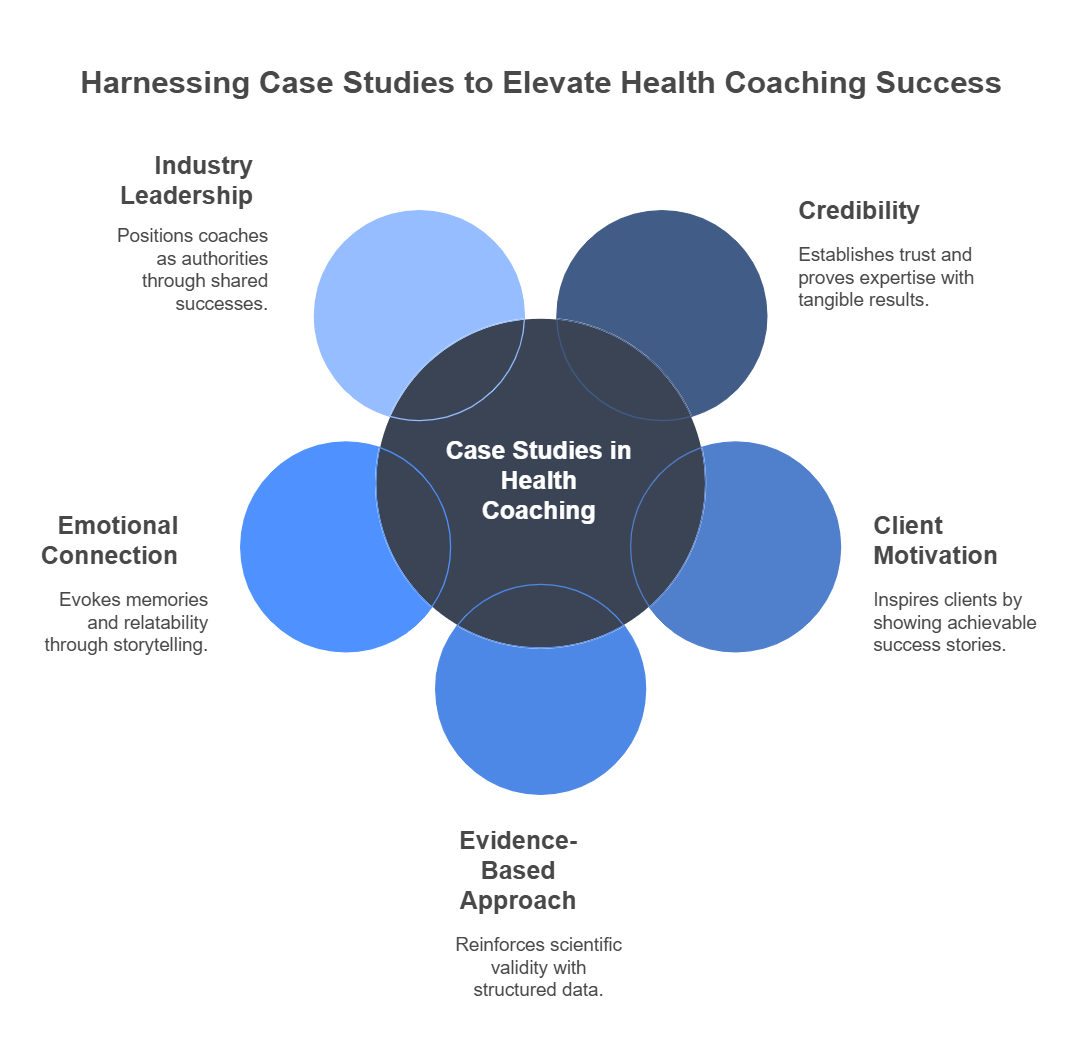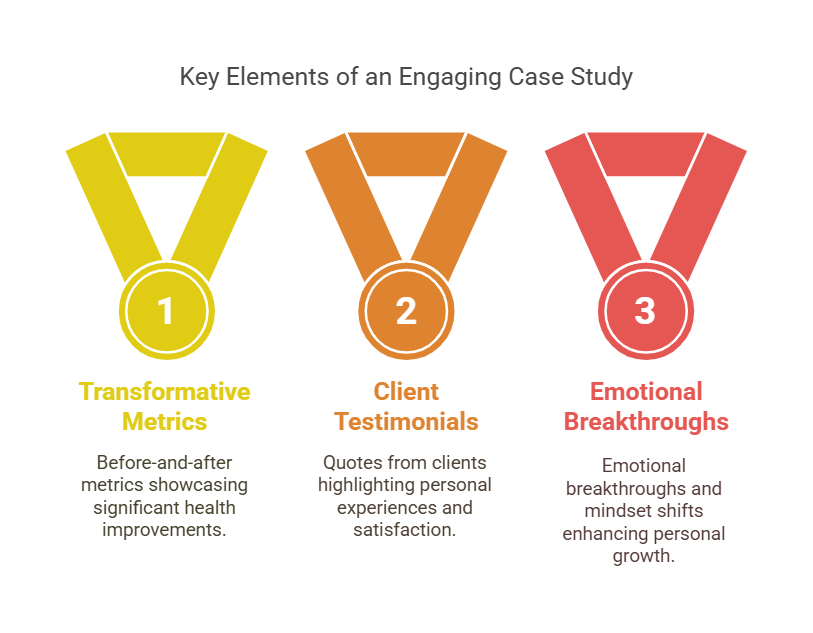How to Effectively Use Case Studies in Health Coaching
Health coaching has evolved dramatically in recent years, with a growing emphasis on evidence-based approaches, client personalization, and behavioral psychology. Whether you’re helping clients manage chronic conditions, lose weight, or develop healthier habits, case studies remain one of the most powerful tools in your coaching arsenal.
But are you using them strategically and effectively?
In this blog, we’ll explore how to leverage case studies to build credibility, inspire clients, and drive engagement—with real-world examples, six lesser-known facts, and updated best practices for 2025.
Why Case Studies Matter in Health Coaching
A case study isn't just a success story—it’s a strategic tool that showcases your expertise, builds trust, and helps potential clients visualize their own transformation.
1. Builds Unshakable Credibility
The health coaching industry is highly competitive. Clients are increasingly skeptical of generalized advice, and they demand proof. A well-documented case study proves your expertise with tangible results, setting you apart from less experienced coaches.
2. Enhances Client Motivation
Seeing another person overcome similar struggles makes success feel more attainable. Case studies bridge the gap between skepticism and belief, showing clients that their goals are possible and achievable with the right guidance.
3. Showcases Your Evidence-Based Approach
Health coaching is shifting toward a more data-driven approach in 2025. Personalized nutrition, AI-powered habit tracking, and bio-individual coaching methods are at the forefront. By presenting structured case studies, you reinforce the scientific validity of your strategies.
4. Strengthens Emotional Connection
Facts tell, but stories sell. A case study isn’t just a list of steps—it’s a narrative that evokes emotions. People are more likely to remember and relate to a human story than generic advice.
5. Positions You as an Industry Leader
Health coaches who document and share their client successes become go-to authorities in their field. By integrating case studies into content marketing, you create a powerful reputation-building machine.
How to Structure a Compelling Health Coaching Case Study
1. Choose a Relevant Case Study
Ensure that the case study aligns with the pain points, demographics, and goals of your ideal clients.
For example:
If your niche is women’s hormonal health, focus on success stories related to PCOS, menopause, or postpartum recovery.
If you specialize in gut health, highlight cases of clients overcoming bloating, IBS, or leaky gut.
2. Use the “Transformation Formula”
A compelling case study should follow this structure:
Client Background: Who they are, their struggles, and what motivated them to seek help.
Goals: Their specific health objectives.
Challenges: The obstacles that prevented progress before coaching.
Interventions: The strategies, tools, and techniques used in the coaching process.
Results: Tangible and measurable outcomes (weight loss, improved biomarkers, lifestyle changes).
Lessons Learned: Key takeaways that reinforce your expertise.
3. Integrate Storytelling with Data
An engaging case study balances emotions and facts. Include:
Before-and-after metrics (weight, blood sugar, fitness levels).
Quotes or testimonials from the client.
Emotional breakthroughs and mindset shifts.
Real-World Case Studies in Health Coaching
Case Study 1: Sustainable Weight Loss for a Busy Mom
Background
Sarah, a 38-year-old working mom, struggled with postpartum weight gain, stress eating, and low energy.
Goals
Lose 30 lbs in a sustainable way.
Overcome cravings and emotional eating.
Build a realistic exercise habit despite her busy schedule.
Challenges
Inconsistent meal patterns.
Lack of motivation.
Time constraints due to parenting and work.
Interventions
Macro-balanced meal planning (without strict dieting).
Habit-stacking workouts (5-minute morning stretches, lunch break walks).
Mindful eating techniques to reduce stress eating.
Results
✅ Lost 31 lbs in 5 months.
✅ Increased energy and improved sleep.
✅ Stopped emotional eating and built lifelong healthy habits.
Case Study 2: Managing Chronic Stress for a Corporate Executive
Background
David, a 45-year-old executive, faced severe stress and burnout due to a high-pressure job.
Goals
Reduce stress levels.
Improve sleep quality.
Restore work-life balance.
Challenges
Chronic anxiety and poor sleep.
Dependence on caffeine for energy.
Irregular meal and exercise routines.
Interventions
Biofeedback stress management tools.
Adaptogenic herbs and personalized supplementation.
Mindful productivity techniques to streamline workload.
Results
✅ 50% reduction in stress levels within 3 months.
✅ Improved sleep and reduced reliance on caffeine.
✅ Increased productivity with better focus and energy.
6 Lesser-Known Facts About Case Studies in Health Coaching
AI-powered health tracking is revolutionizing data collection, making case studies even more powerful.
Emotional intelligence is a key factor in client success—more so than the diet plan itself.
Clients are more likely to trust case studies than expert opinions or certifications.
Micro case studies (short client wins) can be more effective than long success stories.
Video case studies increase engagement rates by 82% compared to text-only formats.
Neuroscience-backed coaching techniques are the next big thing in 2025.
Final Thoughts
In 2025, authenticity, evidence-based coaching, and client storytelling will dominate the health coaching industry. If you're not leveraging case studies, you’re missing a crucial tool for building trust, inspiring clients, and growing your brand.
Start creating a library of case studies today—because nothing is more powerful than real-life success stories.
Would you like a custom template to create your own high-converting case studies? Drop a comment below!
ANHCO is a leading organization in the health and wellness industry, dedicated to training the next generation of expert health coaches. Its Health Coach Certification Program is designed to provide comprehensive education in evidence-based coaching, nutrition, behavior change psychology, and client-centered care. With a focus on real-world application and cutting-edge research, ANHCO equips coaches with the skills needed to create lasting health transformations. Graduates of the program gain industry-recognized certification, positioning them as trusted professionals in the rapidly growing health coaching field.
FAQS
-
Case studies in health coaching serve to demonstrate real-life examples of how coaching strategies and interventions lead to tangible results. They help both the coach and the client understand the practical application of concepts, track progress, and refine coaching methods based on specific client scenarios.
-
Case studies offer clients a relatable context by showcasing how others with similar health challenges have achieved success. This can motivate clients, build trust, and provide them with insights on overcoming obstacles and making sustainable changes.
-
A comprehensive case study should include:
The client’s background (age, health history, goals)
The coaching methods and strategies used
Challenges faced throughout the coaching process
Progress made and any setbacks
Outcomes achieved and how they were measured
Lessons learned during the process
-
It’s essential to anonymize case studies by removing any identifying details about the client. Use pseudonyms and avoid sharing personal information unless explicit consent is given. This protects client privacy while still conveying valuable insights.
-
Yes, case studies can be an effective marketing tool, but they should be used ethically. With client consent, you can highlight successful outcomes and demonstrate the effectiveness of your coaching methods. However, it's important to avoid exaggerating results or creating unrealistic expectations.
-
Select clients who have experienced significant, measurable success in their health journey with your coaching. Ideally, these clients should be willing to share their experiences and provide permission for you to use their story (while maintaining confidentiality).
-
A well-structured case study should follow a clear narrative:
Introduction: Brief overview of the client and their situation
Challenges: Outline the specific health issues and barriers
Intervention: Describe the coaching strategies used
Results: Share measurable outcomes, progress, and successes
Conclusion: Summarize key takeaways and how others can apply the lessons
-
Absolutely! Case studies can be especially powerful in group coaching settings. They allow clients to learn from each other’s experiences, share strategies, and discuss solutions to common challenges. This fosters a sense of community and enhances learning for all participants.



